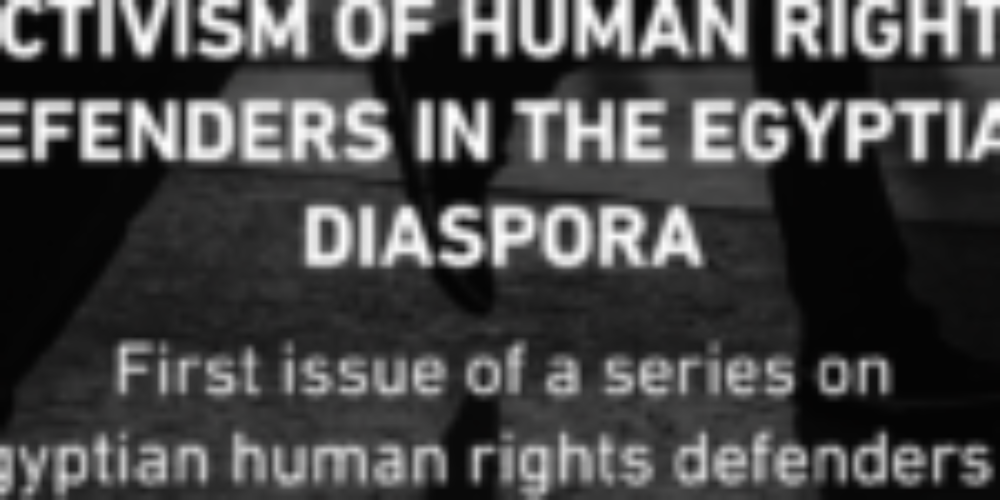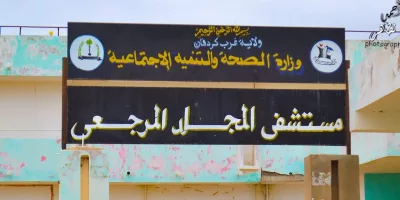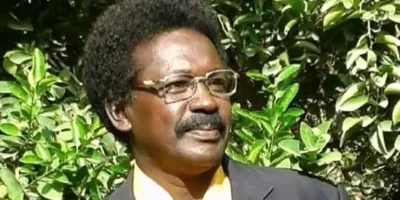While some human rights defenders carry out their peaceful activism under authoritarian regimes, some of them may choose or be forced to seek refuge abroad as a strategy to ensure the sustainability of their activism by protecting their life and mental health.
As part of the Human Rights Defenders Watch, a project to monitor the situation of human rights defenders in Egypt, the Committee for Justice (CFJ) is launching a series of papers on Egyptian human rights defenders in the diaspora. The series provides research and analysis on the forced migration that a number of Egyptian human rights defenders (HRDs) were subjected to in the wake of the events of 2013, and after Abdel-Fattah El-Sisi became president in 2014, as a result of the government’s crackdown on civil society and its human rights icons.
The first research paper is entitled: Activism of human rights defenders in the Egyptian diaspora.
Activists and human rights defenders in the diaspora have played a huge role historically in the mobilization against authoritarian regimes and eventually became among the causes of massive internal changes. Examples include Jose Zlaket, the Chilean human rights activist who was forced out of the country under General Pinochet, engaged in long-term strategies to support his colleagues at home and expose Pinochet’s crimes on a global level in the 1970s and 1980s. This also happened prominently during the uprisings of the Arab Spring.
The paper said that cross-border civil society has an important role in exposing human rights violations and challenging the censorship and obfuscation of authoritarian regimes by exercising the role of mediation between their counterparts at home and the international community, in terms of transferring information and raising international awareness about the true face of those systems.
The paper discussed the Egyptian human rights movement in the diaspora, specifying the reasons that led to the departure of many Egyptian human rights defenders from the country, outlining their activities abroad, and the challenges facing human rights work there.
The paper showed that the Sisi regime has adopted an ideology and stance completely hostile to human rights activity under the guise of the “war on terror.” The Egyptian authorities, since 2014, have relentlessly limited the work and influence of human rights organizations and prosecuted HRDs by all available means, including issuing the law regulating the work of NGOs, and the targeting of more than 31 human rights defenders and 12 human rights organizations in Case No. 173/2011, known in the media as the “Foreign Funding Case”, which the North Cairo Court reopened in 2016. The court ordered the seizure of the funds of a number of human rights defenders and organizations based on the request of the investigating judge, who accused them of receiving funds from abroad with the aim of harming national security. The authorities also arrested defenders and researchers returning from abroad.
The paper also highlighted the activity of human rights defenders in the diaspora, and their attempts to establish organizations to become a nucleus for human rights work and an alternative “transnational” civil society, in order to compensate for the activity from the inside, which has become almost impossible.
HRDs, such as Ahmed Mefreh, CFJ’s Executive Director, believe that in the short term, his organization aims primarily to document the human rights violations carried out by the Egyptian regime against opponents, defenders and citizens at home, to verify their authenticity in order to present them to the Egyptian public opinion in a truthful manner, and to raise awareness about patterns of violations and the protection of victims’ rights in the long term. The strategic objective of the activities of defenders in the diaspora is to stimulate a new phase of national transitional justice that takes the human rights approach as a reference for political reform and democratic transformation, in cooperation with local civil society.
Mefreh added that for the sake of these goals, human rights organizations are moving in different directions. On the one hand, they produce print and visual publications and research materials, in addition to databases of verified and documented violations in accordance with international human rights standards and in accordance with local legislation. For example, CFJ has launched projects that serve its objectives, such as the Detention Watch project, which monitors and documents violations inside Egyptian prisons and detention centers, and the Trial Watch project, which monitors the performance of the judicial system in cases of a political nature, and the Justice Watch Archive, whose aim is to build a documented database on the violations committed by the security authorities and the judiciary against victims.
On the challenges facing human rights work abroad, the paper said that although human rights defenders may escape direct danger or the threat of arrest or prosecution, they start a new cycle of facing other psychological, financial, and legal challenges in the host country, as well as the risk of persecuting their relatives in the country, especially in the cases of activists who have public engagements and opinions against the authoritarian regimes that pushed them to leave.
The paper explained that the first and most serious challenges facing activists abroad is the cyber targeting by governments. A number of Egyptian human rights activists and defenders abroad have already been subjected to these cyber attacks, in addition to attempts to hack personal and work accounts, and the use of embassies and spies to track opponents and human rights defenders abroad, harassing and stalking their relatives inside and using them as a tool to intimidate them and limit their activities.
As for stigmatization of HRDs, the paper cited the example of the incitement to murder by an Egyptian journalist loyal to the Egyptian regime against defender Bahey El Din Hassan, as a result of his work in the field of human rights in Europe and the US.
The paper concluded by emphasizing that the challenges for defenders in the diaspora are not only confined to authoritarian regimes that pushed them outside the country. They also face many difficulties inside the host countries, as settling the legal situation, for example, is a burden, especially for activists and defenders in North African and Middle Eastern countries, compared, for example, with the diaspora activists who came in previous decades to Western countries from Eastern Europe and Latin America and found greater support that enabled them to continue their political and human rights activities.






